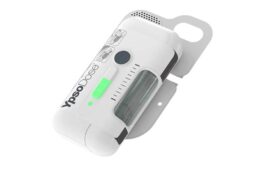 Intersect ENT (NSDQ:XENT) shares plunged today after the company said it failed to meet the primary endpoint in a study of its Ascend investigational drug-coated sinus balloon.
Intersect ENT (NSDQ:XENT) shares plunged today after the company said it failed to meet the primary endpoint in a study of its Ascend investigational drug-coated sinus balloon.
The 70-person, randomized, double-blind trial was designed to compared treatment with Intersect ENT’s DCB when randomized against an uncoated balloon control. The study missed the primary endpoint, frontal sinus patency grade at 30 days, but did show significant differences in secondary endpoints related to its mometasone furoate coating.
The trial showed a reduction in inflammation and polypoid edema at all timepoints through 30 days and a reduction in the need for oral steroid interventions after 30 days. There were no drug- or device-related adverse events. Intersect ENT said the first-of-its-kind trial shows the need for more clinical work to back its bid for pre-market approval from the FDA.
“The Ascend trial gives us valuable insight into the performance of our novel drug-coated balloon, enabling us to refine our clinical and regulatory pathway. We are obviously disappointed that this initial trial did not demonstrate superiority in its primary endpoint. However, as in our prior clinical research with drug-eluting implants, we again observed benefits of providing localized drug delivery of mometasone furoate through combined drug-device offerings,” Intersect ENT president & CEO Tom West said in prepared remarks. “We will continue to analyze the Ascend study findings to inform our clinical and regulatory strategy. We remain committed to leading innovation with clinical evidence for the benefit of clinicians and patients with chronic sinusitis.”
“An initial observation worth noting from the results of this study is the trend for the mometasone furoate to significantly minimize inflammation and edema at the site of dilation when delivered with the Ascend drug-coated balloon, as compared to the uncoated balloon,” added Ohio Sinus Institute director Dr. Boris Karanfilov. “We look forward to assessing the results of the study more extensively with our fellow clinical investigators and Intersect ENT.”
Shares of XENT were down -11.3% at $15.04 each in mid-morning trading today as investors reacted to the news, but at least one analyst thought the downside was overplayed. SVB Leerink‘s Richard Newitter said in a note to investors that he doubted shares will stay down “given that a DCB was a ‘nice-to-have’ not a ‘must-have’ clinical program.”
Intersect ENT management told Newitter that it’s assessing next steps with the FDA to see what the clinical pathway may hold, he wrote, adding that the chances of Ascend hitting the market before 2022 “diminished significantly” after the study.
Filed Under: Drug Discovery and Development




